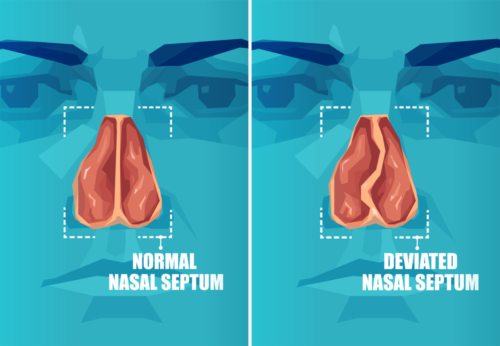A deviated septum is a condition in which the septum (the bone and cartilage that separates the right and left sides of the nose) becomes damaged or compromised. At Advanced Ear, Nose, & Throat Associates in Atlanta, GA, our expert medical professionals are committed to finding solutions for patients with this condition.
What Problems Can a Deviated Septum Cause?
Understanding Septal Deviation
Understanding septal deviation begins with understanding the structure and function of the nose. Aside from the obvious – giving us a sense of smell and allowing us to breathe with our mouths closed – the nose has many important functions in keeping our bodies healthy and functioning properly.
Form and Function
The openings to the nose are called the nostrils, where the air we breathe through our nose first enters. The air then moves through the nasal cavity, which is divided in two by the septum. When a septum becomes “deviated,” this simply means that there has been a growth abnormality or damage, causing one side of the nasal passageway to be thinner and more likely to become blocked than the other.
This nasal passageway is lined with mucous, which catches viruses, bacteria, and other impurities that then are drained to the stomach, where they are destroyed by stomach acids. This mucous also warms and moistens the air we breathe. If the septum actually bends and blocks the nasal passage, it can create several problems.
Prone to Trauma
Given that the septum lies in the middle of the nose, broken noses are a common cause of septal deviation. However, the septum is also often compromised during growth in adolescence, which can cause nasal blockages well into adulthood if untreated.
Symptoms of Deviated Septum
Symptoms vary, and not everyone will experience them the exact same way, so it is important to be evaluated by a doctor. Nonetheless, some common problems present similarly in many cases. Nasal blockages, snoring and sleep apnea, and sinusitis are often reported as problems associated with septal deviation.
Three Problems Caused by Septal Deviation
1. Nasal Blockage
We depend on open nasal passages for comfortable respiration, and when nasal blockages and congestion are present, even normal daily activities can become more challenging. Exercise, cleaning, and simple chores are frustrating when we become limited by breathing difficulties. While nasal blockages can occur in many areas of the nose, they often occur in the nasal passageways divided by the septum.
Symptoms
Nasal blockage is a cause for discomfort in and of itself, but it can also create a range of related issues from sleep disturbances to infection. Typically septal deviation can cause a moderate degree of nasal blockage, which is usually worse on one side of the nose. This can contribute to the feeling of a chronic stuffy nose and getting enough air through the nose during exercise or exertion can be difficult.
2. Snoring and Sleep Apnea
While snoring is often written off as an annoyance to loved ones who live with us, it may actually be a bigger problem than we give it credit for. Snoring disrupts sleep, which then causes daytime fatigue, which can then cause forgetfulness and difficulty concentrating. Snoring alone does not typically cause any other medical problems, but it can be quite a nuisance in our lives.
Snoring caused by septal deviation is usually because one side of the nasal passageway is thinner than the other, creating less room for air to move. That being said, anytime there is a narrowing of airways there is also a risk of sleep apnea, which is a more serious condition.
Symptoms
At a minimum, sleep apnea can cause frequent nighttime awakenings, choking or gasping during sleep, and rapid heartbeat. At it’s worst, sleep apnea can cause labored breathing or even stop-breathing spells. As sleep apnea worsens, symptoms may spill over into the daytime hours and may include fatigue, headaches, and irritability.
3. Sinusitis
We have already learned that a deviated septum creates nasal blockages. This, in turn, may contribute to chronic sinusitis. Sinusitis is infection and inflammation of the sinuses. When mucous cannot drain properly, it increases the likelihood of bacterial growth, which increases the likelihood of infection.
Chronic sinus infections may be less severe than acute infections, but they are more frequent and persistent, and symptoms continue to return. Often, antibiotic treatment clears the infection up for the short term, but infection typically re-occurs.
Symptoms
Chronic blockages caused by a deviated septum are not just inconvenient: they can be downright frustrating. When infection and inflammation occurs, some symptoms include headache, postnasal drainage, facial pressure, and even chills and fever. Less serious is the irritation to the throat that nasal congestion causes, which is often worse in the morning.
Treatments for Septal Deviation
Despite the problems that can be caused by septal deviation, the good news is that there are various successful and proven treatments. Since everyone’s physiology is different, it is important to see a doctor who specializes in ear, nose, and throat conditions in order to identify a treatment plan designed specifically for you. Individualized treatment plans are a necessary course of action to prevent and treat problems associated with a deviated septum.
Breath Easy
Our experienced doctors are the state’s top-rated medical professionals in Otolaryngology and take great pride in helping patients overcome deviated septum. Please call Advanced Ear, Nose, & Throat Associates in Atlanta, GA for a consultation or go to our website to begin your new patient registration.

